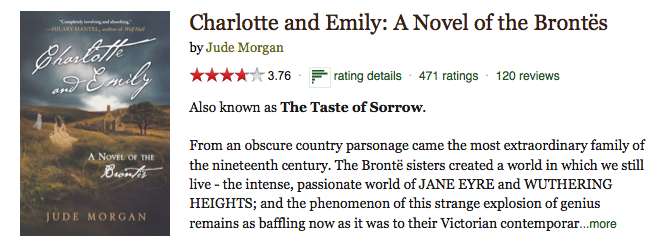Amazon reviews can be helpful. I find them particularly valuable when I’m buying an appliance I’m not too sure about, but I admit that there are some aspects of Amazon reviews—of all types—that I find problematic. I never rely on Amazon book reviews, for instance.
In order to present my case, I selected a book I read in the last few years, Jude Morgan’s [amazon_link id=”B004P5OPAW” target=”_blank” ]Charlotte and Emily: A Novel of the Brontës[/amazon_link]. You can read my review of this book here. For the record, I loved it.
 Forgive the apostrophe error in the title; it’s not mine. Note that the book is rated at 4.5 stars with only 12 reviews.
Forgive the apostrophe error in the title; it’s not mine. Note that the book is rated at 4.5 stars with only 12 reviews.
On Goodreads, the same book:
 The rating is 3.76 stars with 120 reviews and 471 ratings.
The rating is 3.76 stars with 120 reviews and 471 ratings.
To be fair, this book’s title in the UK is The Taste of Sorrow (much better title, but the publisher likely thought Americans wouldn’t get it), and Goodreads compiles reviews for both titles. Amazon does not, so I searched for that book and found only 5 more reviews (all 5-stars). Amazon UK’s site has 58 reviews for The Taste of Sorrow averaging 4 stars.
The first issue I see is that literary fiction, especially from authors who are not as well known (especially in the US), don’t receive a lot of reviews on Amazon. Compare the number of ratings for each book. The novel was rated only 12 times by Amazon reviews, but it received 471 total ratings, 120 of which also had written reviews, on Goodreads. As a result, one review, either direction, makes a big difference. With books that receive a large number of Amazon reviews, the ratings tend to even out to numbers that resemble those on Goodreads more closely, but for niche books that don’t have a wide audience, Amazon isn’t often that helpful for readers trying to decide whether or not to read a book.
Amazon requires written reviews; readers cannot simply rate a book on a star system without writing an explanation of their rating. While I find that requirement helpful, as often understanding the reason for the review helps me more than a simple star-rating, I can understand why some people might not want to bother.
On the other hand, I find Amazon reviews often focus on the packaging or some other insignificant detail of the book when what I want to know is whether it’s a good book or not. I find it maddening that so many Amazon reviewers still do not understand this concept: the review is for the product itself, not for the service, the packaging, or any other element. I don’t care if it was packaged well and arrived promptly.
One recent trend I’ve noticed on Amazon is for reviewers to write amusing, over-the-top reviews for products that it’s clear they haven’t used, but that they find funny. A case in point is the product page for Sugar Free Gummi Bears, which has pretty much devolved into TMI toilet humor. It’s so bad that the same kind of reviews are being written on the product pages for regular Gummi Bears, which, to my knowledge, do not seem to have the same purported laxative effect as the sugar-free ones. Amazon doesn’t do anything to prevent these kinds of reviews. I don’t want to be a downer, as I actually do think these kinds of reviews can be fun (maybe not the Gummi Bears in particular, but you have to admit the reviews for the Mountain’s Three Wolf Moon tee-shirt are classic). I like amusing reviews. I just want to know that people who are reviewing a product are familiar with it and not just writing reviews to be funny. There is a way to write funny reviews that are also helpful.
A final issue I have with Amazon reviews is that you can rate reviews as either helpful or not. A lot of people use this function exactly as it’s supposed to be used: to upvote reviews that are particularly helpful and downvote reviews that are not helpful. However, a significant number of Amazon users use this feature to downvote reviews with which they disagree, especially if you didn’t like a book they loved or if you loved a book they hated. Or perhaps because they’re capricious and/or ignorant. Who knows?
One of the reasons I started a book blog many years ago is that I didn’t like reviewing my books on Amazon, for all the reasons I’ve shared here. Had Goodreads existed back when I started this blog, the blog might not exist, as I still find Goodreads very helpful and probably would have decided to write books reviews there. Barnes and Noble, with its focus on books and more literary bent, is also helpful, though it suffers from the same issues with literary fiction as Amazon: Charlotte and Emily has only 7 reviews on their site.
I very rarely write Amazon reviews, but at this stage, I think I’m giving up on writing them completely. Any authors who share books with me with the hopes of seeing them reviewed on Amazon have a right to know so that they can decide whether they want to share books if they will be reviewed only on my blog, Goodreads, and Shelfari. I think Amazon’s review system is broken, and I believe sharing my reviews in these other venues is ultimately more helpful, even if fewer people will read them.
None of my concerns about Amazon reviews prevent me from purchasing products from the site, but they prevent the site from being as useful as it might be.



